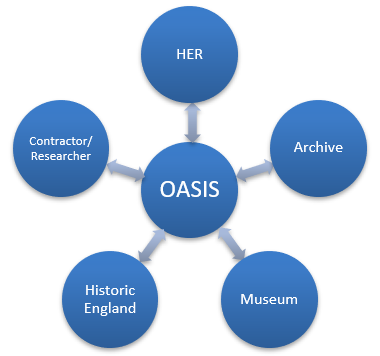England
OASIS (England) facilitates the flow of information from historic environment recording and research projects through all stages of reporting, publication and archiving. OASIS welcomes information from anyone undertaking fieldwork relating to the archaeology and built heritage of England, and shares this information with the relevant local and national bodies.
Information gathering and sharing
OASIS (England) is inclusive of all types and techniques of historic environment investigations relating to the terrestrial and marine environments in England, covering all aspects from earliest prehistory to 20th century, built heritage research through to geophysical survey.
Building on the success of the previous project, OASIS has been redesigned to help data producers (including archaeological contractors and consultants, community groups, academics, architectural historians and independent researchers) share their findings with historic environment curators and interested parties.
The OASIS form gathers key information about the investigation and its findings and enables data providers to:
- share their information with local authority Historic Environment Records or Historic England (when relating to scheduled monuments and the marine historic environment);
- upload digital copies of completed project archive reports (grey literature);
- upload associated spatial data defining project extents;
- contribute research results to the corresponding Regional Research Frameworks;
- share details about archive deposition to the relevant museum or records repository; and
- improve communication between local authority and national heritage services, contractors and archives.
The latest upgrade to OASIS is a central part of the Heritage Information Access Strategy (HIAS), a sector-wide initiative to improve online access to heritage information in England. In particular OASIS supports HIAS principle 4 that “investigative research data or knowledge should be readily uploaded, validated and accessed online.”
Following extensive feedback from the sector, OASIS has been designed to accommodate local workflows for example where an HER may wish to initiate OASIS records to be completed by data providers. Some HERs have chosen to opt out of actively reviewing OASIS records (known as OASIS LITE) and reports released to the ADS Library through this route are published with a disclaimer.
Each OASIS record will remain live, making it possible for records to be updated with new information throughout the project life cycle, such as scientific dating or archive accessioning details, or the uploading of specialist reports during the post-excavation process.

OASIS now incorporates links to controlled vocabularies on heritagedata.org.uk to encourage consistent indexing of information to terminology standards used by HERs and the Heritage Gateway. This also means that as terminologies are enhanced, these new terms are available for use in OASIS.
OASIS also uses online data services to improve the accuracy of its records and reduce the need for manual data inputting and checking. The project administration areas are automatically generated from the project grid reference or location file, which also identifies the relevant HER(s).
The research results of projects are captured in OASIS and these can be linked to the corresponding Research Frameworks. This will help capture and make available new knowledge and contribute to completing the research cycle.
As part of Historic England's on-going commitment to make the findings of its research available to local authority historic environment services and the public, Historic England will be creating OASIS records for all its historic environment investigations. OASIS records will be started at the outset of each project, and completed as the project reaches conclusion.
The submission of project information via OASIS is also specified as a requirement for all Historic England funded investigations.
If you would like further information about the project please see the FAQs. For technical advice, please contact the ADS Technical Team.